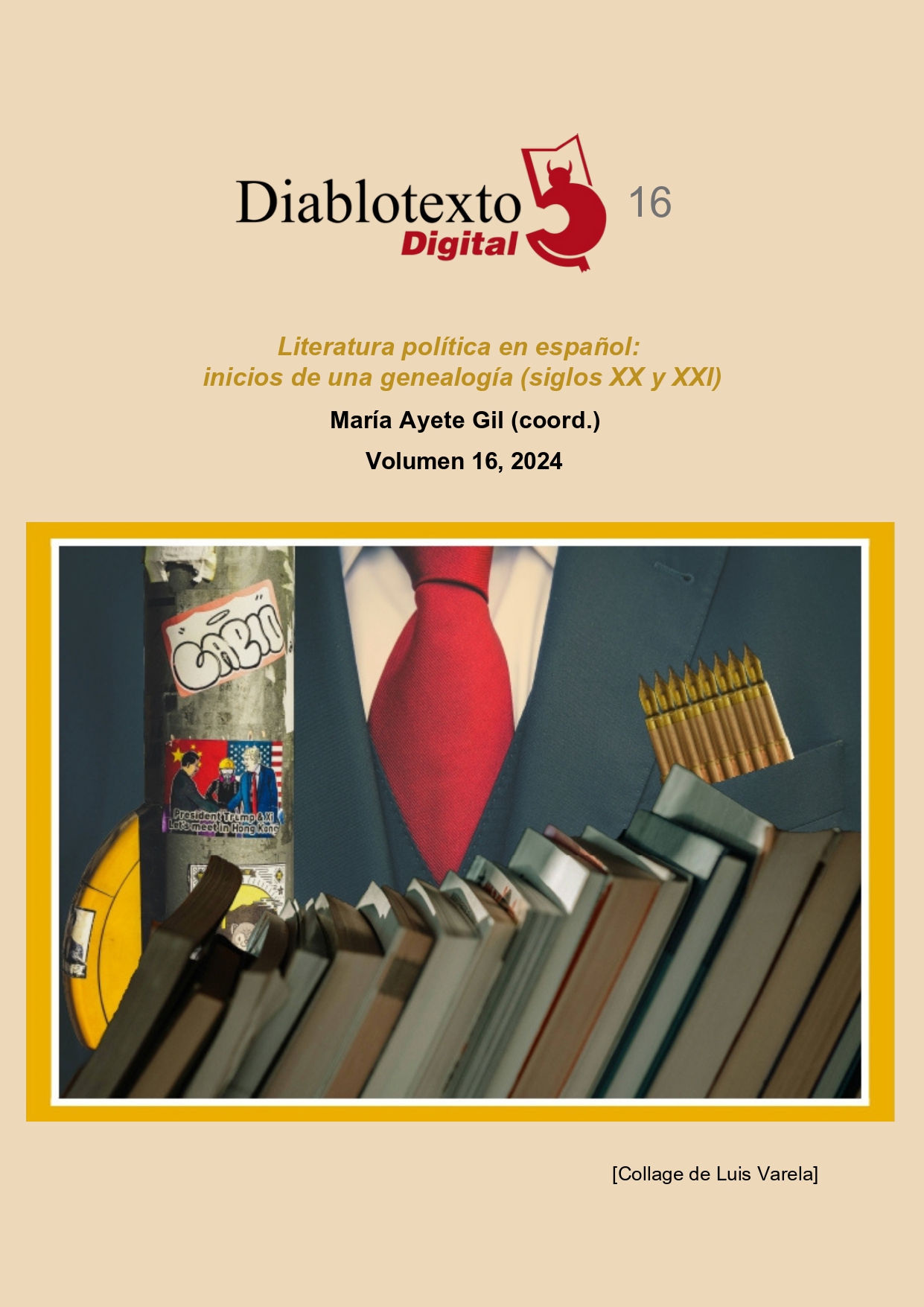Social and political novel: the longing for a triumphant life
DOI:
https://doi.org/10.7203/diablotexto.16.29068Keywords:
political novel, social novel, ideology, ideological unconscious, Fredric Jameson Abstract
Abstract
In recent years, especially after the economic crisis of 2008, critical literary production has gained prominence in the Spanish literary space. Drawing on previous theoretical developments by Juan Carlos Rodríguez, David Becerra, Maria Ayete, César de Vicente or Fredric Jameson and relying on novels from the last two decades, we propose categories for the analysis of its very different strands: the one that sustain the status-quo, that which address social problems from a reformist humanism and the one that point to the structure of capitalism, unveil its ideological mechanisms and even point to a transformative way out. It is theoretical-critical exercise that tries to adopt the yearning for a triumphant life proposed by Belén Gopegui.
 Downloads
Downloads
 References
References
AYETE GIL, Maria (2023). Ideología, poder y cuerpo. La novela política contemporánea. Manresa: Bellaterra.
BASABE, Nere (2019). "Memoria histórica, violencia política y crisis de identidades en la nueva narrativa española". En Christian Claesson (ed.). Narrativas precarias. Xixón: Hoja de lata, pp. 21-57.
BECERRA MAYOR, David (2013). La novela de la no ideología. Madrid: Tierradenadie.
BENJAMIN, Walter (1990). El origen del drama barroco alemán. Trad. José Muñoz. Madrid: Taurus.
BLOCH, Ernst (2017). ¿Despedida de la utopía?. Trad. Sandra Santana. Madrid: Antonio Machado Libros.
CARBALLAL, Alba (2023). Bailaréis sobre mi tumba. Barcelona: Seix Barral.
CLAESSON, Christian (2019). “Introducción”. En Christian Claesson (ed.). Narrativas preciaras. Crisis y subjetividad en la cultura española actual. Xixón: Hoja de Lata, pp. 9-20.
DE VICENTE, César (2013). La escena constituyente. Teoría y práctica del teatro político. Madrid: Centro de Documentación Crítica.
DE VICENTE, César (2009). "Literatura y teatro proletarios". En Julio Rodríguez-Puértolas (ed.). La República y la cultura. Paz, guerra y exilio. Madrid: Akal, pp. 31-38.
EAGLETON, Terry [1997] (2021). Ideología. Trad. Jorge Vigil. Barcelona: Paidós.
EAGLETON, Terry [1981] (2023). Walter Benjamin o hacia una crítica revolucionaria. Trad. Julia García. Madrid: Cátedra.
ECHEVARRÍA, Ignacio (2005). Trayecto. Un recorrido crítico por la reciente narrativa española. Barcelona: Debate.
EL MAIMOUNI, Youssef (2021). Cuando los montes caminen. Barcelona: Roca.
EL MEHDATI, Meryem (2022). Supersaurio. Barcelona: Blackie Books.
FISHER, Mark (2009). Capitalist Realism. Is there no alternative? Winchester: O Books.
GENOBART, Andrea (2023). Consum preferent. Barcelona: Anagrama.
GIORDANO, Chiara (2018). "La teoría del inconsciente ideológico de Juan Carlos Rodríguez: una línea de fuga entre marxismo, psicoanálisis y estudios literarios", Romanica Olomucensia, vol. 30, n.º 1, pp. 111-124.
GOPEGUI, Belén (2008). Un pistoletazo en medio de un concierto. Acerca de escribir de política en una novela. Madrid: Complutense.
GOPEGUI, Belén (2019). Rompiendo algo. Escritos sobre literatura y política. Barcelona: Penguin Random House.
GRANDES, Almudena [2015] (2022). Los besos en el pan. Barcelona: Tusquets.
GUTIÉRREZ, Pablo (2012). Democracia. Barcelona: Seix Barral.
HELLÍN, Lucía (2023). La literatura de los desplazados. Autores ectópicos y migración. Madrid: Villa de Indianos.
HELLÍN, Lucía (2016). "Una travesía política: el extrañamiento de Brecht como propuesta transformadora de la desautomatización del formalismo ruso", Castilla. Estudios de Literatura, n.º 7, pp. 461-491.
JAMESON, Fredric (1979). "Reification and Utopia in Mass Culture", Social Text, n.º 1, pp. 130-148.
JAMESON, Fredric (1989). Documentos de cultura, documentos de barbarie. Trad. Tomás Segovia. Madrid: Visor.
JAMESON, Fredric (2009). Arqueologías del futuro. El deseo llamado utopía y otras aproximaciones de ciencia ficción. Trad. Cristina Piña. Madrid: Akal.
KOSÍK, Karel (1967). Dialéctica de lo concreto.Trad. Adolfo Sánchez. México: Grijalbo.
LIJTMAER, Lucía (2022). Cauterio. Barcelona: Anagrama.
LUXEMBURG, Rosa (2021). Socialismo o barbarie. Buenos Aires: IPS.
MARX, Karl y ENGELS, Friedrich (2005). La ideología alemana. Buenos Aires: Santiago Rueda.
MONTERO, Rosa (2020). Los tiempos del odio. Barcelona: Seix Barral.
MUZZIOLI, Francesco (2021). Scritture della catastrofe. Instruzioni e ragguagli per un viaggio nelle distopie. Milano: Meltemi.
MUZZIOLI, Francesco (2022). Le teorie della critica letteraria. Roma: Carocci.
RODRÍGUEZ, Juan Carlos (2002). De qué hablamos cuando hablamos de literatura. Granada: Comares.
RODRÍGUEZ, Juan Carlos (2015). Para una teoría de la literatura. Madrid: Marcial Pons.
RODRÍGUEZ-PUÉRTOLAS, Julio (1976). Literatura, historia, alienación. Barcelona: Labor Universitaria.
ROSA, Isaac (2011). La mano invisible. Barcelona: Seix Barral.
ROSA, Isaac (2020). Tiza Roja. Barcelona: Seix Barral.
TROTSKY, León (2004). Escritos filosóficos. Buenos Aires: CEIP León Trotsky.
VOLOSHINOV, Valentín (1992). El marxismo y la filosofía del lenguaje. Madrid: Alianza.
WHITING, Kate (2023). "This is why 'polycrisis' is a useful way of looking at the world right now", World Economical Forum, 7-8-2023. Disponible en: <https://www.weforum.org/agenda/2023/03/polycrisis-adam-tooze-historian-explains/> [Fecha de consulta: 22 de junio de 2024].
ZIALI, Karima (2023). Una oración sin dios. Granada: Esdrújula.
Downloads
Published
How to Cite
-
Abstract84
-
PDF (Español)24
Issue
Section
License
Licencia de reconocimiento de Creative Commons “Reconocimiento - No Comercia l- Sin Obra Derivada
Authors who publish with this journal agree to the following items:
The authors will keep their copyright and guarantee the journal the right of first publication of their work, which will be simultaneously subject to the Creative Commons license that allows third parties to share the work indicating its author and its first publication in the journal. The authors may adopt other non-exclusive license agreements to distribute the version of the published work (e.g., depositing it in an institutional telematic file or publishing it in a monographic volume), with an acknowledgment of its initial publication in this journal. The authors are allowed and encouraged to disseminate their work through the Internet (e.g., in institutional telematic archives or on their website) before and during the submission process, which can produce interesting exchanges and increase citations of the published work. (See Effect of Open Access)




